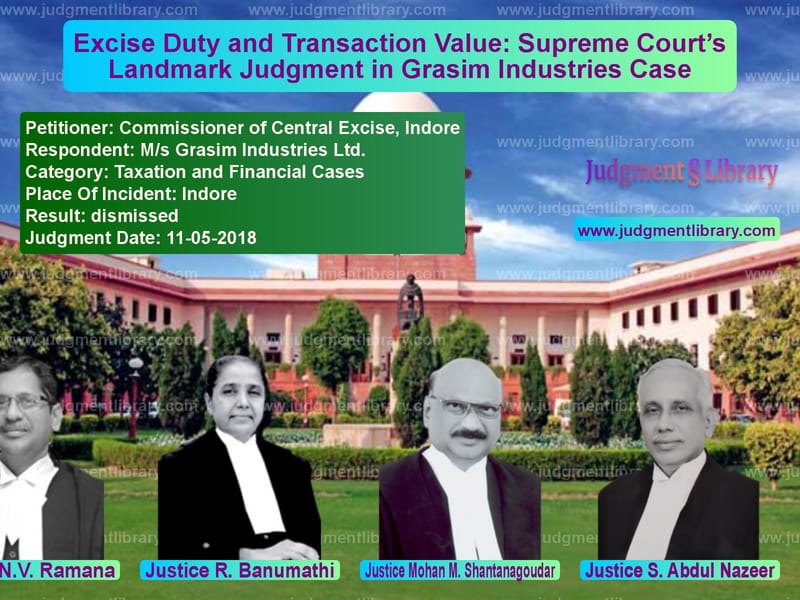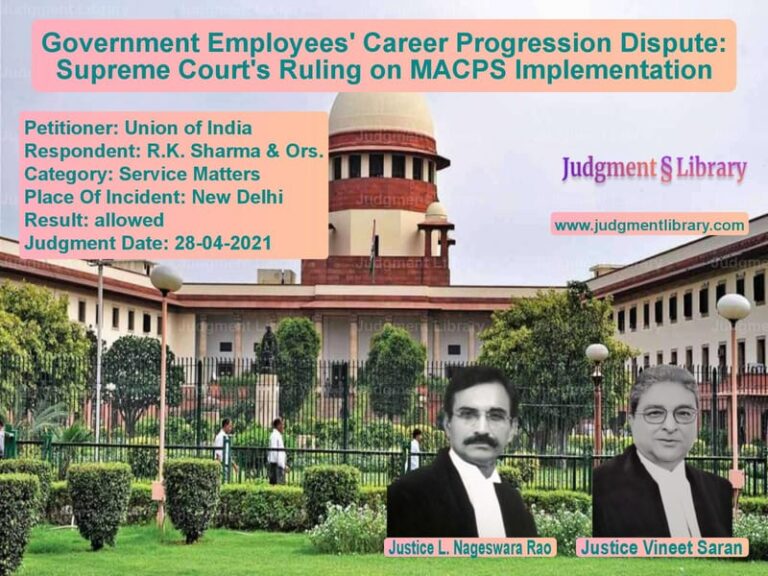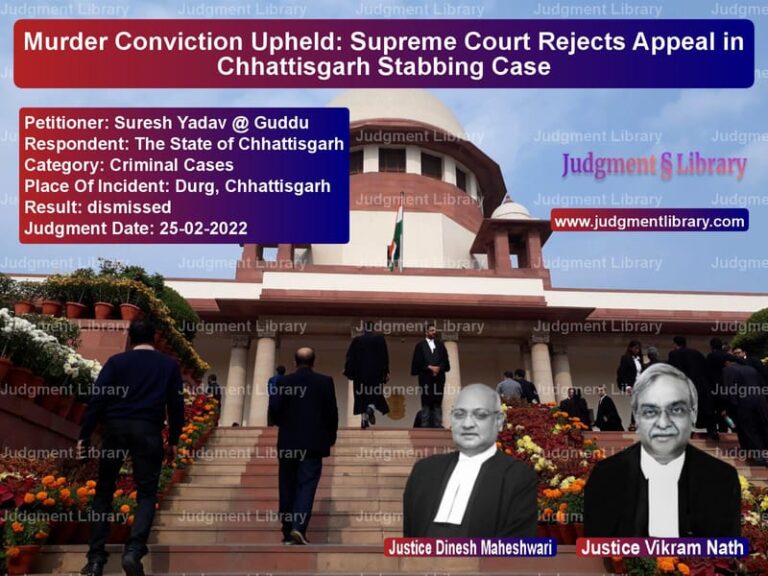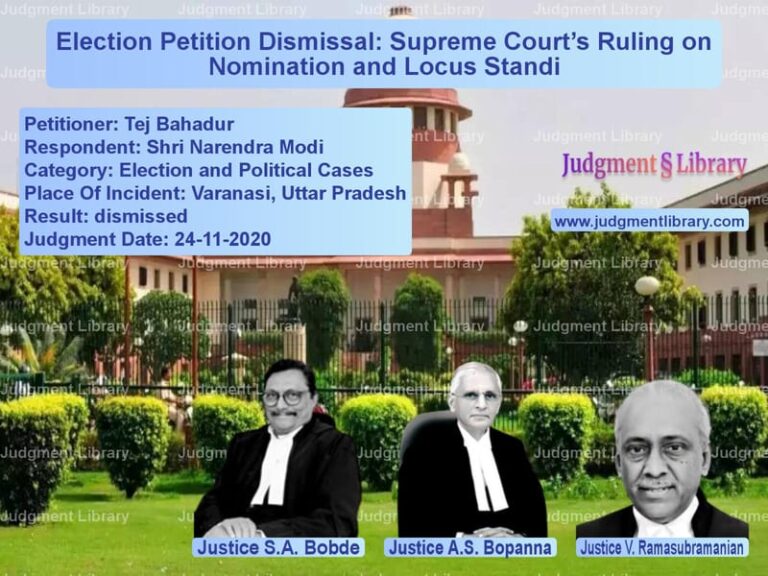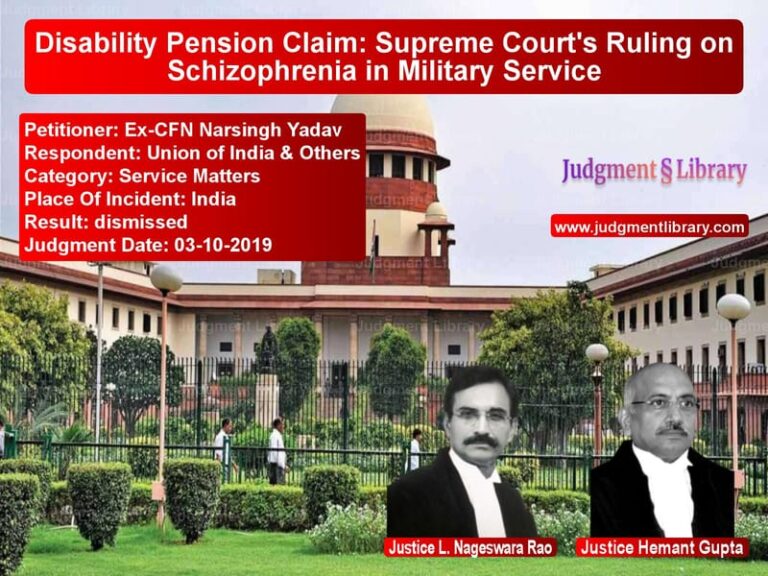Excise Duty and Transaction Value: Supreme Court’s Landmark Judgment in Grasim Industries Case
The case of Commissioner of Central Excise, Indore v. M/s Grasim Industries Ltd. revolved around the interpretation of excise duty valuation under the Central Excise Act, 1944. The Supreme Court was called upon to decide whether additional charges levied by the assessee, such as packing charges, wear and tear charges, facility charges, service charges, and rental charges, should be included in the valuation for excise duty.
This case was significant because it sought to resolve the conflict between the concepts of ‘normal price’ and ‘transaction value’ after the 2000 amendment to Section 4 of the Central Excise Act. The Court had to determine whether excise duty should be calculated based solely on manufacturing cost and profit or if it should also include ancillary costs incurred before the first sale.
Legal Issues Before the Court
- Does Section 4 of the Central Excise Act (as amended from July 1, 2000) operate independently, or is it subject to Section 3?
- What is the correct interpretation of Sections 3 and 4 regarding the scope of excise duty valuation?
- Did the introduction of ‘transaction value’ in 2000 alter the fundamental principle of excise duty?
Petitioner’s Arguments
The Commissioner of Central Excise, Indore, contended that excise duty should be determined based on the transaction value, which includes all additional charges levied on customers. The petitioner heavily relied on the Supreme Court ruling in Union of India v. Bombay Tyre International Ltd., which held that all costs incurred up to the point of sale must be included in determining excise duty.
The petitioner argued:
- Excise duty is a tax on manufacture, and it should include costs that contribute to the overall value of goods.
- The 2000 amendment replaced ‘normal price’ with ‘transaction value’ to ensure a broader and more inclusive valuation.
- Charges such as packing, storage, delivery, and other related expenses must be included in the excise valuation.
Respondent’s Arguments
The respondent, M/s Grasim Industries Ltd., countered that excise duty should be levied solely on the manufacturing cost and profit. They relied on the ruling in Commissioner of Central Excise, Pondicherry v. Acer India Ltd., which clarified the distinction between excisable and non-excisable elements in tax assessment.
The respondent contended:
- Excise duty should be based only on the cost of manufacturing the goods.
- Ancillary charges such as marketing, handling, and delivery should not be included in the transaction value.
- The principle that excise duty is a tax on manufacture, not on sale, should remain unchanged.
Supreme Court’s Observations
The Supreme Court thoroughly examined past judgments and legal principles governing excise duty, referring to cases such as:
- Central Provinces and Berar Sales of Motor Spirit and Lubricants Taxation Act, 1938 – which defined excise duty in India.
- Bombay Tyre International Ltd. Case – which emphasized that excise duty should include costs that enhance the value of goods.
- Acer India Ltd. Case – which provided insight into how transaction value should be interpreted in taxation.
The Court made the following critical observation:
“Excise is a levy on manufacture and upon the manufacturer who is entitled under law to pass on the burden to the first purchaser of the manufactured goods. The levy of excise flows from a constitutional authorisation under Entry 84 of List I of the Seventh Schedule to the Constitution of India.”
Key Judgment Excerpts
The Court ruled that the concept of ‘transaction value’ introduced in 2000 includes additional costs beyond manufacturing expenses:
“Transaction value as defined in Section 4(3)(d) brought into force by the Amendment Act, 2000, statutorily engrafts the additions to the ‘normal price’ under the old Section 4 as held to be permissible in Bombay Tyre International Ltd.”
The Court further clarified:
“The measure of the levy contemplated in Section 4 of the Act will not be controlled by the nature of the levy. So long as a reasonable nexus is discernible between the measure and the nature of the levy, both Section 3 and Section 4 would operate in their respective fields.”
Final Judgment
The Supreme Court upheld the broader interpretation of ‘transaction value’ and ruled that additional charges incurred before the first sale must be included in the valuation for excise duty. The petition was dismissed, reaffirming the principle that excise duty is not limited to manufacturing cost but also includes ancillary costs that contribute to the overall value of goods before entering the market.
Petitioner Name: Commissioner of Central Excise, Indore.Respondent Name: M/s Grasim Industries Ltd..Judgment By: Justice Ranjan Gogoi, Justice N.V. Ramana, Justice R. Banumathi, Justice Mohan M. Shantanagoudar, Justice S. Abdul Nazeer.Place Of Incident: Indore.Judgment Date: 11-05-2018.
Don’t miss out on the full details! Download the complete judgment in PDF format below and gain valuable insights instantly!
Download Judgment: Commissioner of Cent vs Ms Grasim Industrie Supreme Court of India Judgment Dated 11-05-2018.pdf
Direct Downlaod Judgment: Direct downlaod this Judgment
See all petitions in Income Tax Disputes
See all petitions in GST Law
See all petitions in Tax Evasion Cases
See all petitions in Judgment by Ranjan Gogoi
See all petitions in Judgment by N.V. Ramana
See all petitions in Judgment by R. Banumathi
See all petitions in Judgment by Mohan M. Shantanagoudar
See all petitions in Judgment by S. Abdul Nazeer
See all petitions in dismissed
See all petitions in supreme court of India judgments May 2018
See all petitions in 2018 judgments
See all posts in Taxation and Financial Cases Category
See all allowed petitions in Taxation and Financial Cases Category
See all Dismissed petitions in Taxation and Financial Cases Category
See all partially allowed petitions in Taxation and Financial Cases Category

